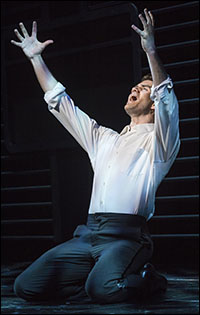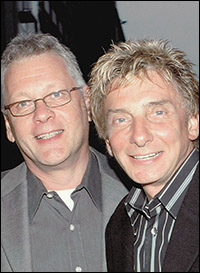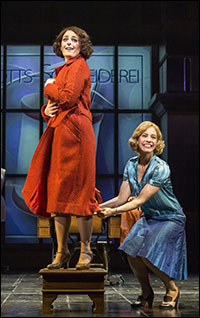
*
When Barry Manilow and Bruce Sussman cold-called the Alliance Theatre in Atlanta peddling a long-cherished musical theatre project, they got through the theatre employee screening the call (who offered a dubious "Yeah, sure") and were ultimately patched through to Susan V. Booth, Jennings Hertz artistic director. Booth's first words upon answering the phone: "Gentlemen, please tell me you're calling about Harmony."
In fact, they were. "We were on the phone for about an hour, and by the time we hung up, we had an opening night," recalled Sussman. "No lawyers, no nothing."
The lights considered to run green as representatives of Center Theatre Group in Los Angeles, hearing of the Alliance run, called Sussman and Manilow to express interest in a co-production. With that, the long overdue harmonic convergence was complete. Sixteen years after its world premiere at the La Jolla Playhouse and scuttled plans for a Broadway run, Harmony would sing anew.
And given the path that this "new musical" — which opened March 12 at the Ahmanson Theatre, featuring music by Manilow and book and lyrics by Sussman — has taken to achieve a second life, its creators are still practically pinching themselves over the show's newfound good fortune. "Ask anyone who has been there, from La Jolla all the way to here, they would always tell you that Harmony was a wonderful show that deserved a future," said Manilow, "but we always got stuck climbing that mountain. I've really got to take my hat off to the people who get their shows up. I mean it, man. Don't ask me what I think of [the content]. If they can get their show up, my hat's off to them."
| |
 |
|
| Shayne Kennon in Harmony. | ||
| photo by Craig Schwartz |
Some 10 months later, the two future partners met. "And we talked theatre," said Manilow who had written a musical adaptation of the melodrama The Drunkard at the age of 19.
"We met to write shows," insisted Sussman. "People hear Harmony and say, 'Oh this doesn't sound like Barry Manilow,' and I say, "You've got that backwards. It was the pop career that was a diversion."
"When (record producer) Clive Davis gave me 'Mandy,' it was a rock and roll song, so I used my arranging chops to make it into a big ballad, the first power ballad ever," returned Manilow. "That was because I love arranging and producing and coming up with ideas. I took all those things I learned over the years from cabaret and from theatre and put them into the pop music world. All those key changes everybody talks about... they come from Bye Bye Birdie. I loved getting up on stage, but I am much more comfortable doing this."
| |
 |
|
| Bruce Sussman and Barry Manilow | ||
| Photo by Michael Simon |
Harmony was inspired by a three-hour German documentary directed by Eberhard Fechner that Sussman discovered in 1994. The Comedian Harmonists were a wildly popular music and comedy sextet in pre-World War II Germany, half of whose members happened to be Jewish. The rise of the Nazi party forced the band to leave the country and splinter off. The musical is told from the perspective of "Rabbi" Josef Roman Cykowski, the last surviving member of the harmonists who met and was interviewed by Manilow prior to his death in 1998.
During their heyday, the Comedian Harmonists (who were also the subject of the film "The Harmonists" and the musical Band in Berlin) were as popular as the Beatles, the Backstreet Boys, One Direction or name-your-swoon band. That neither Sussman nor Manilow had even heard of the group prior to seeing the documentary prompted Sussman to propose turning their tale into a musical.
"I realized the fact that I didn't know them is the story," said Sussman, who was in Berlin starting his research mere months after seeing the film. "I realized this is a show about the quest for harmony in what turned out to be the most discordant chapter in human history. Let me at it."
The play's world premiere came at the end of the La Jolla Playhouse's "15/50" anniversary season (15 years since the Playhouse's revival and 50 years total existence), a season that would also see the launch of the national tour of Rent by Playhouse artistic director Michael Greif. But while Jonathan Larson's rock opera was already famous, Harmony was the season's wild card, according to Neel Keller who, at the time, was the Playhouse's artistic associate. "I think the expectation going in with Harmony was really 'Let's see what is this going to be. What kind of a musical will Barry Manilow write?'" said Keller, who is reunited with the new version of Harmony as the associate artistic director at CTG. "It was really sort of a wildfire. People came and realized, 'Oh, it's a brand new musical. It's not a musical of all music that we've heard before.'"
The La Jolla Playhouse cast, under the direction of David Warren, featured future Broadway lights Janet Metz, Patrick Wilson, Danny Burstein and Rebecca Luker (who would later marry). In the ensemble was San Diego native and future The Drowsy Chaperone and The Book of Mormon director Casey Nicholaw.
"If there was a 'star' among us, it was Rebecca Luker," said Thom Christopher Warren, who played Harry, who assembled the group. "She had done Secret Garden and Show Boat and was about to do The Sound of Music. Nobody knew who Danny Burstein (who played Rabbi) was, but let me tell you the moment he opened his mouth, we knew he would be something special."
| |
 |
|
| Hannah Corneau and Leigh Ann Larkin in Harmony. | ||
| Photo by Craig Schwartz |
He was also the last to leave. Warren was part of every subsequent incarnation of Harmony from a star-packed industry reading at the Douglas Fairbanks Theatre (where Brian D'Arcy James and Christiane Noll replaced Burstein and Luker) to a planned out-of-town engagement that died before it could get to Philadelphia.
Warren toured with Manilow and fellow Harmony singers in an effort to raise interest and funders, but the project stalled. Now with the new version of the show about to open, Warren said any bittersweet feelings over having aged out of the play are tempered by his pride for Manilow and Sussman finally getting to see their baby walk again.
"After 27 years of doing this professionally, Harmony is still the pinnacle for me creatively and artistically," said Warren, who is currently performing in the Broadway company of The Lion King, "and a lot of that comes down not only to Bruce and Barry's words and notes. The way they handled this piece of storytelling has always been graceful and wonderful and so full of love."
The creators maintain this new version has been reassembled entirely on their terms. The La Jolla Playhouse version — which received mixed reviews — was lengthy and included a first act that ran nearly two hours. For the reboot, directed by Tony Speciale, songs have been added, while others have been cut and some have given to different characters. The creators joke that "Every Single Day," originally written for Rabbi, has been sung by every character in the show. A person who listens to Manilow's catalog will not necessarily expect to hear male singers united in intricate six-part harmony or to hear two women sing a duet ("Where You Go") inspired by the Book of Ruth.
"Pop music was always the most difficult for me because you've got nothing to write about except 'I love you' or 'I miss you,'" said Manilow. "That's it for 30 years: I love you or I miss you. Every time Bruce and I would try to do something a little more interesting, Clive would say, 'Oh that belongs in a Broadway play.'










